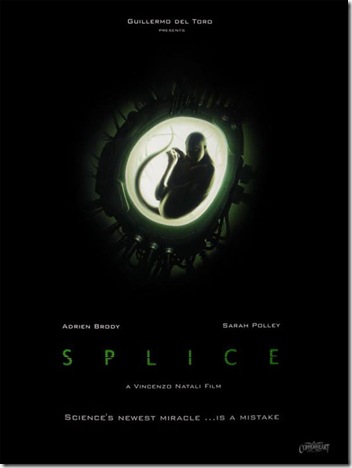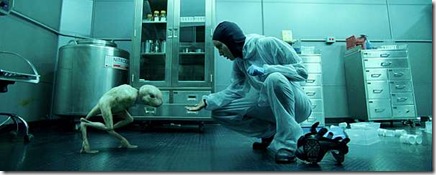Splice is the latest there-are-things-Man-was-not-meant-to-know movie – a modern update on Mary Shelley’s Frankenstein, via James Whale’s original Frankenstein movie. Like that film, there will no doubt be a number of critics and members of the audience who view it as a revolting piece of trash. I expect that, like Whale’s Frankenstein, it will survive and be both respected and appreciated.
Co-writer/director Vincenzo Natali – he of the low-budget sci-fi masterpiece Cube – makes the Shelley/Whale connection clear from the start. His two scientists, Clive [Adrien Brody] and Elsa [Sarah Polley] are namesakes Colin Clive [the actor who played Victor Frankenstein in Whale’s Frankenstein], and Elsa Lanchester [who played the titular Bride of Frankenstein].
Clive and Elsa are hotshot bio-engineers who’ve been featured on the cover of Wired. Their latest experiments have created a couple of loving organisms they call Fred and Ginger – capable of producing proteins that will have medical value, but only for animals. While they want to take their experiments to the next level – weaving a bit of human DNA into the mix, the conglomerate for which they work decides to cit funding for that line of research and invest in the proteins.
Needless to say, that doesn’t sit well with Clive and Elsa – though it takes Elsa’s going solo in the lab to create the new organism even as the rest of the place is being converted for the new project. The resulting creature, which Elsa soon calls Dren [Nerd spelled backward] is a unique hybrid that grows more – and less – human in very short order, and matures physically as quickly.
Splice has a small number of extremely good CG effects and a limited cast, so every penny of its budget is onscreen – and Splice looks good. The story, which takes the usual forbidden science experiment tropes and plays them out in a deliberate, atmospheric way, is filled with moments of creepiness and a couple of good jump moments. Brody and Polley give Clive and Elsa a really good shorthand – they know each other so well that they don’t have to explain every little thing as they move through the story. That helps us buy into the premise. Important bits of information are doled out at just the right pace to hold out interest – even though this is very old school filmmaking and things don’t happen at the usual breakneck speed.
Dren – once past the CG baby stage, is well played by Abigail Chu [Young Dren] and Delphine Chaneac [Grown Dren]. Both have an extreme range for playing emotions without speech, and both help create a vibrant personality for the unique young hybrid. Dren’s rapid maturation process pulls Clive and Elsa into a quasi-parental situation – they have to deal with Dren’s moods and illnesses, scenes that create genuine warmth and worry. There’s an especially good sequence where Elsa is appalled by the actions a silky teen-equivalent Dren, and another where sexual common sense flies out the window.
Of course, since Splice is a variation on the Frankenstein story, things have to fall apart at some stage – and this is where the film falls a bit short. After dealing with ideas like bioethics, the constitution of the family unit, the effects of heredity, and the concept of playing God, Splice devolves into chase/hunt sequence. It is at once a variation on the angry villagers idea and a Hollywood cliché. If it wasn’t for one circumstance – hinted at earlier, in one of the film’s few bloody scenes – it could have killed the film.
Instead, Splice is a chilling little film that has more than enough substance to provoke post-theater conversation – and re-establishes Natali as a talent worth watching.
Final Grade: B+

